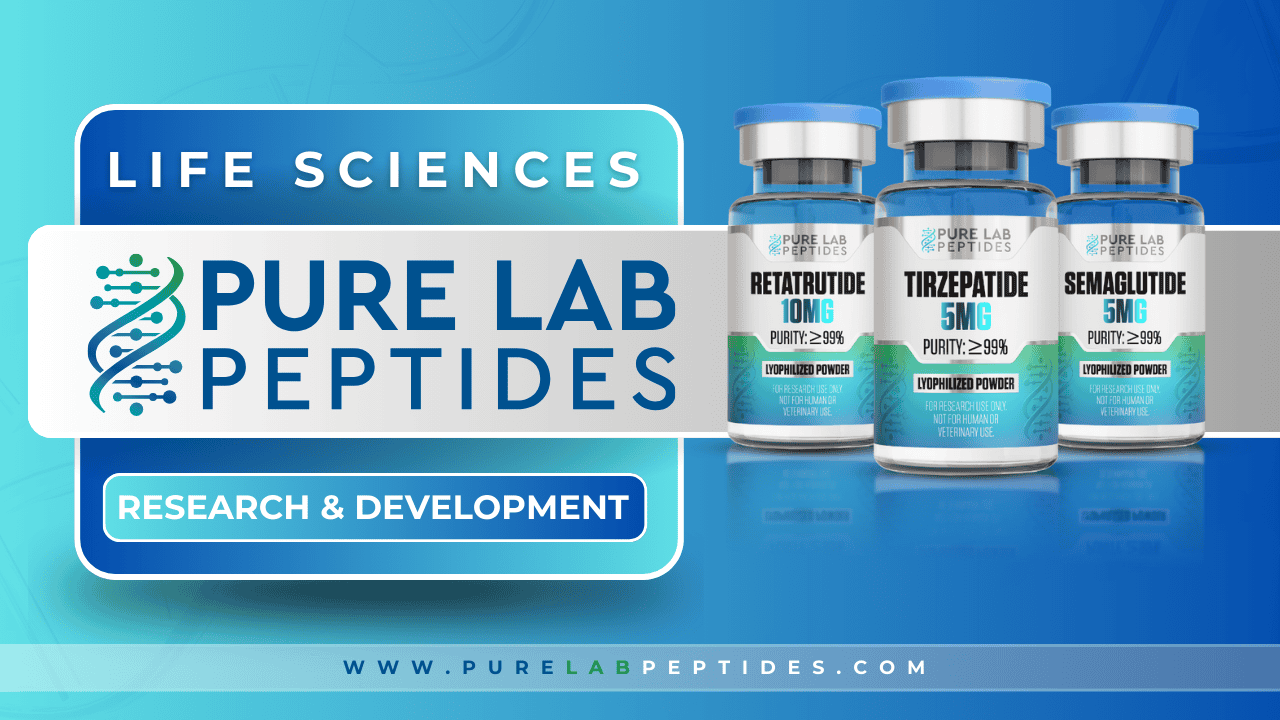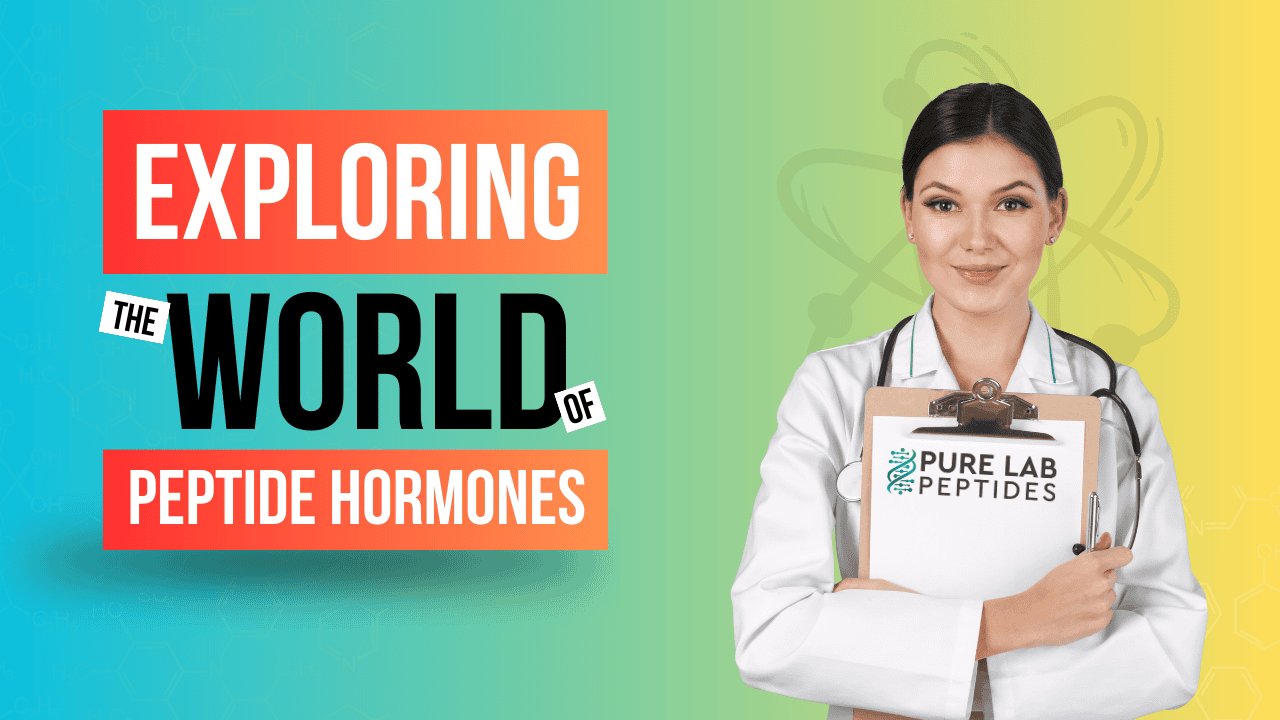

Peptide hormones play a crucial role in the intricate dance of cellular signal transduction mechanisms.
This article delves into understanding peptide hormones, their binding receptors, and the pathways they initiate.
It’s crucial reading if you’re fascinated by cellular biology and how these small but mighty molecules can influence everything from growth to defense mechanisms.
Peptide hormones are short chains of amino acids that serve as signaling molecules in the body. They are typically synthesized in varying amounts within cells, each with specific tasks to achieve.
Unlike steroid hormones, peptide hormones are water-soluble and act by binding to receptors on the cell surface. This difference allows them to effect changes much more rapidly than their fat-soluble counterparts.
Cellular signal transduction is the process through which cells interpret and respond to external signals via receptors and signaling pathways. It’s like the cellular version of playing telephone, but far more reliable.
Peptide hormones initiate signal transduction by binding to specific receptors on the cell membrane. This interaction triggers a cascade of intracellular events, leading to a targeted response.
Key signaling pathways involving peptide hormones include the MAPK/ERK pathway, PI3K/AKT pathway, and JAK/STAT pathway. Each pathway converts extracellular signals into specific intracellular actions.
A peptide signal can modulate these pathways by either activating or inhibiting certain processes, depending on the type of receptor it binds to.
Receptors are specialized protein molecules situated on the cell surface or within cells. They interpret the extracellular signals sent by peptide hormones and translate them into cellular responses.
Peptide hormones bind to receptors through the lock-and-key mechanism, whereby the peptide acts as the key and the receptor as the lock, ensuring highly specific interactions.
Signal peptides are short sequences within a peptide hormone that direct the hormone’s transport to specific locations within the cell. Think of them as a postal address for cellular delivery.
Signal peptides facilitate hormone function by ensuring the hormone reaches its intended destination within the cell, maximizing efficiency and effectiveness.
Peptides activate signaling pathways by binding to specific receptors, triggering a signal transduction cascade that leads to the desired cellular response.
Peptide signaling pathways are intricately linked to cellular functions such as growth, development, and immune responses. Disruptions in these pathways can lead to various diseases.
Natriuretic peptides are a family of peptides that regulate blood volume and pressure by promoting sodium and water excretion. They play a critical role in cardiovascular homeostasis.
Natriuretic peptides affect cellular signaling by binding to specific receptors on the cell surface, initiating a cascade that affects renal and cardiovascular function.
Antimicrobial peptides are small proteins that serve as part of the innate immune system, offering the first line of defense against pathogens.
Antimicrobial peptides function by disrupting microbial cell membranes, signaling immune cells to respond to the threat and thus playing a dual role in direct and indirect defense.
Peptides and proteins interact in various ways to transmit signals within the cell. Peptides often act as signaling molecules, while proteins function as receptors or components of signaling pathways.
Protein networks within cells integrate multiple peptide signals, ensuring that the appropriate cellular response is carried out efficiently.
Plant peptides are small proteins that function as signaling molecules in plants, playing critical roles in growth, development, and stress responses.
Plant peptides differ from their animal counterparts in that they often travel longer distances within the plant to exert their effects, influencing entire plant organ systems.
Small peptides are shorter chains of amino acids that can act as potent signaling molecules in various biological systems.
Small peptides can influence cellular signaling by rapidly diffusing through tissues and binding to receptors to trigger immediate cellular responses.
Peptide hormones are used in treating a variety of diseases, including diabetes (insulin), osteoporosis (parathyroid hormone), and cardiovascular conditions (natriuretic peptides).
The future of research in peptide signaling pathways looks promising, with potential applications in personalized medicine and novel therapeutic approaches.
Recent studies have shown that peptides can have multi-functional roles, acting not only as hormones but also as immune modulators and signaling molecules.
These advances expand our understanding of how peptides interact within the biological system, offering new insights into targeting diseases at the molecular level.
Cellular signals mediated by peptides are crucial for normal growth and development. Disruptions can lead to developmental abnormalities and diseases.
Disrupted peptide signals can lead to various conditions, including cancer, metabolic disorders, and immune deficiencies.
Enzymes such as guanylyl cyclase play a pivotal role in the signaling mechanisms of natriuretic peptides, converting GTP to cGMP to mediate cellular effects.
Natriuretic peptides modulate blood pressure by affecting sodium excretion in the kidneys, leading to reduced blood volume and pressure.
Antimicrobial peptides are linked to various conditions, including infections, autoimmune diseases, and even some cancers.
Therapeutic potential is being explored through developing synthetic analogs and enhancing natural peptides to combat antibiotic-resistant bacteria.
Protein modifications such as phosphorylation and glycosylation are critical in peptide signaling as they can alter the activity and stability of proteins involved in signaling pathways.
Examples include insulin signaling via the insulin receptor and cytokine signaling via the JAK-STAT pathway, demonstrating the essential role of peptide-protein interactions.
Advances include engineering plant peptides to improve disease resistance and enhance nutrient use efficiency, contributing to sustainable agricultural practices.
Plant peptides can improve crop resilience by enhancing their ability to respond to environmental stresses, such as drought and pathogen attack.
Small peptides are being utilized in synthetic biology to create biomimetic systems and optimize metabolic pathways in engineered organisms.
Small peptides are engineered through techniques such as directed evolution and rational design to achieve enhanced functionalities like increased stability or specificity.
Common pathways include the MAPK/ERK pathway and the PI3K/AKT pathway, both integral to regulating cell proliferation, survival, and differentiation.
Peptide signaling pathways are assessed using techniques such as western blotting, mass spectrometry, and imaging technologies to track protein interactions and modifications.
Signal peptides guide protein targeting by directing proteins to specific organelles within the cell, such as the endoplasmic reticulum, ensuring proper protein localization and function.
Systems such as the secretory pathway in cells utilize signal peptide mechanisms to ensure that proteins reach their correct destinations for proper cellular operation.
Health issues linked with dysfunctional natriuretic peptides include hypertension, heart failure, and certain kidney disorders.
Dysfunction is diagnosed through blood tests measuring peptide levels and managed through medications that mimic or enhance the effects of natriuretic peptides.
Antimicrobial peptides facilitate immunity by directly killing pathogens and signaling immune cells to initiate an immune response.
Pathogens targeted include bacteria, fungi, and viruses, showcasing the broad-spectrum activity of antimicrobial peptides.
Peptide receptors are classified based on their structure and function, including G-protein-coupled receptors and receptor tyrosine kinases.
Effective receptors must have high affinity for their peptide ligands and be capable of transducing the signal efficiently to downstream signaling pathways.
Applications include the development of peptide-based drugs, biosensors for detecting diseases, and bioengineering of crops for enhanced traits.
Peptide hormones are engineered using techniques such as recombinant DNA technology and peptide synthesis to enhance their stability and efficacy.
Emerging trends include the use of artificial intelligence for peptide design and the exploration of peptides as biomarkers for various diseases.
Current research impacts future applications by providing insights into peptide structure-function relationships and facilitating the development of novel therapeutic strategies.
The structural features of peptides and receptors, such as shape and charge distribution, affect their binding affinity and specificity.
Cellular metals, such as zinc and calcium, play crucial roles in stabilizing peptide-receptor interactions and facilitating signal transduction.
Diseases such as cancer, diabetes, and neurodegenerative disorders can disrupt peptide signal integrity, leading to impaired cellular function.
Signal pathways are compromised through mutations, altered peptide processing, or receptor malfunctions, resulting in abnormal cellular responses.
Methods include biochemical assays, imaging techniques, and computational modeling to measure the kinetics and dynamics of peptide signaling pathways.
Pathway efficiency can be enhanced by optimizing peptide-receptor interactions and modifying downstream signaling components for improved signal transduction.
There is growing interest in using plant peptides therapeutically, given their bioactivity and potential health benefits, such as antimicrobial and anti-inflammatory effects.
Research supports these hypotheses through studies demonstrating the efficacy of plant peptides in animal models and their potential to enhance human health.
The key functional differences include size, stability, and diffusion rates, with small peptides often having faster signaling capabilities compared to larger proteins.
Size affects signaling efficacy by influencing how quickly and efficiently peptides can reach their target receptors and initiate cellular responses.
Peptide hormones such as insulin and glucagon regulate metabolism by influencing glucose uptake and utilization, affecting overall metabolic rates.
Peptide hormones play critical roles in tissue growth and repair by promoting cell division, differentiation, and protein synthesis, essential for maintaining tissue integrity.
Peptide hormones act more rapidly than steroid hormones due to their water-solubility and cell surface receptor interactions, while steroid hormones often have longer-lasting effects.
The advantages of peptide hormones include their rapid action and specificity, while disadvantages may include shorter half-lives. Steroid hormones, on the other hand, have longer-lasting effects but may take longer to initiate.
Peptide signaling pathways have evolved to become highly specialized and efficient, allowing organisms to respond swiftly to environmental changes and internal signals.
These pathways offer evolutionary advantages by enabling precise control of physiological processes and adaptation to diverse environmental conditions.
Antimicrobial peptides possess biochemical properties such as amphipathicity, enabling them to interact with and disrupt microbial membranes effectively.
These properties facilitate the rapid and efficient killing of pathogens, making antimicrobial peptides essential components of the innate immune response.
Current delivery systems include oral, injectable, and transdermal methods, each designed to enhance peptide stability and absorption.
Innovations involve developing nanoparticles and biodegradable polymers to improve the targeted delivery and sustained release of peptide hormones.
Peptides influence cancer cell behavior by modulating cell proliferation, apoptosis, and migration, offering potential targets for cancer therapy.
Therapies being developed include peptide vaccines, peptide inhibitors, and peptide conjugates that specifically target cancer cells without affecting normal cells.
Environmental stressors such as drought, salinity, and pathogens can alter the expression and functionality of plant peptides, affecting plant resilience and productivity.
Mechanisms include the activation of stress-responsive pathways and the synthesis of protective peptides that help plants withstand adverse conditions.
Functional assays used include ELISA, western blotting, and fluorescence microscopy to measure peptide hormone levels, receptor binding, and downstream signaling.
These assays contribute to research by providing detailed insights into peptide hormone function, enabling the development of targeted therapies and diagnostic tools.
Diseases linked to peptide hormone imbalances include diabetes, osteoporosis, and cardiovascular diseases, highlighting the critical role of hormones in maintaining health.
Imbalances are diagnosed through blood tests and imaging techniques, with treatments involving hormone replacement therapy, lifestyle changes, and medication.
Industrial applications include developing new antibiotics, bio-preservatives, and antimicrobial coatings for medical devices and food packaging.
Commercialization involves optimizing peptide synthesis, enhancing stability, and conducting clinical trials to ensure safety and efficacy.
Computational modeling is utilized to simulate peptide-receptor interactions, predict signaling outcomes, and design novel peptides with enhanced functionalities.
Available tools include molecular dynamics simulations, docking software, and bioinformatics platforms that facilitate the study and design of peptide signaling pathways.
External factors such as pH, temperature, and ionic strength can significantly influence peptide-receptor interactions, affecting binding affinity and signaling efficiency.
Temperature can impact the structural stability and dynamics of both peptides and receptors, potentially altering their interactions and signaling outcomes.
Regulatory mechanisms include feedback loops, post-translational modifications, and receptor recycling, all of which help maintain signaling homeostasis.
Signaling can be tightened or loosened through changes in peptide concentration, receptor availability, and the activation or inhibition of downstream signaling components.
Plant peptides are highly relevant for future agriculture. They help enhance crop resilience to stress, improve growth, and increase overall plant health.
Peptide signaling directs plant development by mediating cell-to-cell communication via signaling pathways. It influences growth factor activities and regulates various peptide functions within plant cells.
Antimicrobial peptides are promising in clinical applications for their broad-spectrum activity against pathogens. They are being explored for treating infections, and recent studies show their potential in overcoming antibiotic resistance.
Yes, SPs (signaling peptides) and phytohormones both play roles in plant defense and stress tolerance. Both utilize signaling cascades to trigger plant cell responses that enhance resilience.
Peptide drug discovery is experiencing a resurgence. Advances in peptide modifications and the development of rationally designed peptides show promise in creating more effective peptide-based therapeutics.
Plant peptides are perceived by the cells through specific receptors on the cell surface. These receptors recognize signaling sequences within the peptides and initiate downstream signaling cascades.
Plant peptides are processed from larger precursor proteins and undergo post-translational modifications like phosphorylation and glycosylation, enhancing their stability and functionality.
Peptides can travel significant distances within the plant, facilitating systemic signaling. For example, root-derived peptides may influence shoot development through long-distance signaling pathways.
Plant peptides were discovered through biochemical studies and molecular biology techniques. The history of peptide discovery includes isolating short peptides from plant extracts and identifying their roles in growth and stress responses.
The insulin receptor (IR) is a protein kinase that binds insulin, triggering a signaling cascade regulating glucose uptake. This receptor activity illustrates the intricate relationship between peptide hormones and cellular functions.
Dr. Lei Wang is a distinguished researcher in the field of therapeutic peptides, with a particular focus on peptide drug discovery and development. With over 15 years of experience, Dr. Wang has made significant contributions to the understanding and application of peptides in medicine. His research has been pivotal in advancing the field of peptide therapeutics, particularly in areas such as cancer, cardiovascular diseases, and diabetes.
Dr. Wang’s notable publications include:
Dr. Wang’s work is characterized by its innovative approach and rigorous methodology, earning him recognition and respect in the scientific community. He has received several awards, including the National Science Foundation of China Award, underscoring his authority and trustworthiness in peptide research.
Dr. Qingyu Wu is a leading expert in plant peptide signaling, with extensive experience in the study of peptide-mediated communication in plants. Dr. Wu’s research has significantly advanced our understanding of how peptides regulate plant development and stress responses. With a career spanning over two decades, Dr. Wu has published numerous influential papers and has been a key figure in the field of plant biology.
Key publications by Dr. Wu include:
Dr. Wu’s contributions have been instrumental in uncovering the roles of peptides in plant biology. His research is known for its depth and precision, making him a trusted authority in the field. Dr. Wu has been honored with several prestigious awards, including funding from the National Key Research and Development Program of China, which further attests to his expertise and the impact of his work.
Brutkiewicz, R. R. (2016). Cell signaling pathways that regulate antigen presentation. The Journal of Immunology, 197(8), 2971–2979. https://doi.org/10.4049/jimmunol.1600460
Lee, S., Jiao, M., Zhang, Z., & Yu, Y. (2023). Nanoparticles for interrogation of cell signaling. Annual Review of Analytical Chemistry, 16(1), 333–351. https://doi.org/10.1146/annurev-anchem-092822-085852
Mendez, J., & Toker, A. (2024). Minimizing shear stress in cell signaling studies. Current Protocols, 4(3). https://doi.org/10.1002/cpz1.1019
Thannickal, V. J., & Fanburg, B. L. (2000). Reactive oxygen species in cell signaling. AJP Lung Cellular and Molecular Physiology, 279(6), L1005–L1028. https://doi.org/10.1152/ajplung.2000.279.6.l1005
Wang, Y., & Jiao, Y. (2023). Cell signaling in the shoot apical meristem. PLANT PHYSIOLOGY, 193(1), 70–82. https://doi.org/10.1093/plphys/kiad309
ALL ARTICLES AND PRODUCT INFORMATION PROVIDED ON THIS WEBSITE ARE FOR INFORMATIONAL AND EDUCATIONAL PURPOSES ONLY. The products offered on this website are intended solely for research and laboratory use. These products are not intended for human or animal consumption. They are not medicines or drugs and have not been evaluated or approved by the FDA to diagnose, treat, cure, or prevent any disease or medical condition. Any form of bodily introduction is strictly prohibited by law.




Discount Applied Successfully!
Your savings have been added to the cart.